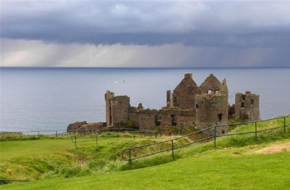Mary C. Kelly

Mary C. Kelly, Ph.D., is Professor of History at Franklin Pierce University, where she has taught for twenty-five years. Her Masters in Modern Irish History is from University of Galway, in Ireland, and her Ph.D. in Modern American History is from Syracuse University. Her research explores Irish-American ethnic identity and the historical relationship with Ireland. She recently edited the book Navigating Historical Crosscurrents in the Irish Atlantic (Cork University Press, 2022), and also published Ireland's Great Famine in Irish American History (Rowman & Littlefield, 2014) and The Shamrock and the Lily (Peter Lang, 2005). Professor Kelly was honored with the 2016 Holyoke St. Patrick's Day Committee Ambassador Award and a 2014 Keene State College President's Outstanding Women in New Hampshire Award. She hails from Westport, in County Mayo, in the west of Ireland.
Available Program Formats: Illustrated online presentations with flexible scheduling options. April-October in-person presentations within a 20-mile radius of Keene, NH. Weekend scheduling available for all programs.
Mary C. Kelly's Programs

“A Nation Once Again:" Ireland's Road to Independence, 1169-1999
Centuries of rebellion and political turmoil make up Ireland’s long campaign for nationhood. Since the 1100s, ancient Irish folk traditions and monastic settlements preserved Gaelic culture through a succession of Viking, Norman and British colonization waves. This presentation explores a storied history of struggle from the Gaelic chieftains to the Ireland of today, using contemporary texts and colorful illustrations depicting centuries of leadership, military confrontation, and political transition. From Strongbow to the IRA, and from Wolfe Tone’s United Irishmen to the tense drama of the 1916 Rising, we encounter the key players, contending traditions, and political forces that finally made Ireland “A Nation Once Again.”

Book Group - Popular history books
Mary facilitates discussions on popular history books. If you are interested in reading books on popular history (fiction or non fiction), please reach out to Mary directly to confirm interest and availablity.
Available Program Formats: Illustrated online presentations with flexible scheduling options. April-October in-person presentations within a 20-mile radius of Keene, NH. Weekend scheduling available for all programs.
Book Groups offer an opportunity for participants to engage with diverse perspectives in the humanities through literature to build understanding, empathy, and to support a culture of reading in the Granite State. New Hampshire Humanities provides expert facilitators; host organizations must provide the books.

Ireland's Great Famine in Irish-American History: Memory and Meaning
Just as the Declaration of Independence inaugurated a new American nation, Ireland’s Great Famine of 1845-1852 transformed American streetscapes with an extraordinary Irish influx. This illustrated presentation reveals human floodtides who escaped Ireland’s ravaged countryside on grim “coffin ships” and found refuge in teeming American tenements. From images of Ireland’s devastation and the unwelcome Catholic Irish presence in American harborsides, we examine the complexities of Famine remembrance and the place of the episode in the lives of Irish exiles in America. From there, we encounter powerful sources of ethnic Irish political and cultural advancement over 20th century decades, from John L. Sullivan to the Kennedys and beyond, as we track the Famine’s memory and meaning through subsequent generations.
As we contemplate almost two centuries of Irish American achievement in politics, education, labor, faith, and sports through the lens of Famine remembrance and commemoration, we may also reflect on American progress to independence and the upcoming 250th anniversary. This program invites you to experience Ireland’s Famine as a crucial episode for the Irish in America, and understand how its legacy continues to shape what it means to be Irish-American as the US marks its 250th anniversary.


Peaceful Revolutionary, Enduring Symbol: St. Patrick's Life & Powerful Legacy Today
Marking the 250th anniversary of the Declaration of Independence allows us to reflect on the imprint of historical actors and events in our lives today. Why do we look to the past to inform our sense of ourselves, our communities, and our identities? How does commemoration of historical events exert meaning in our lives? Explore themes of faith, freedom, and revolutionary change through St Patrick's life and legacy. Travel historical pathways from Ancient Ireland to today's exuberant annual holiday--when "everyone is Irish" for a day. Experience 5th century Latin, Roman and Irish images and texts that reveal Early Christian Irish worlds of slavery and mysticism, Patrick's transformational revolution in faith, his journey to sainthood and then to national symbol, and the colorful legacy he is associated with today. If you have Irish roots, or just enjoy the festivities on March 17th, this presentation will transport you from Ancient Irish foundations to modern American remembrance forms, and illuminate why St. Patrick's name has endured for more than a millennium and a half.
